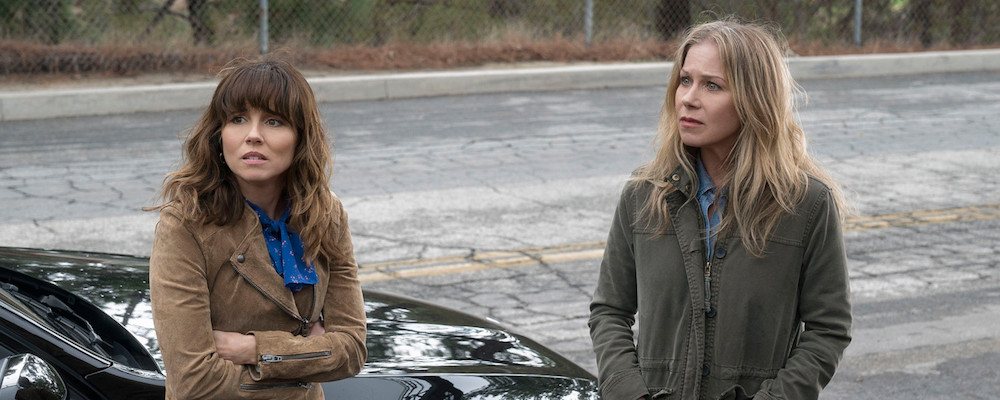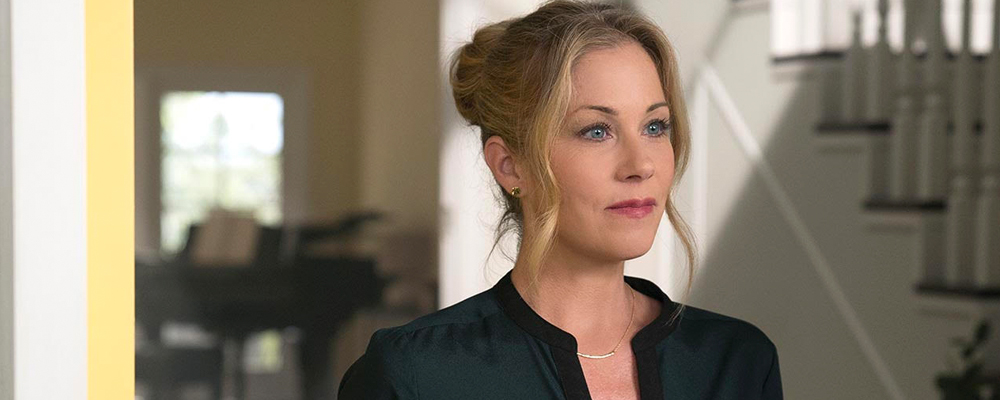Netflix’s ‘Dead to Me’ Brilliantly Finds Sharp Humor in the Process of Grieving
Alci Rengifo
The new Netflix dramedy “Dead to Me” pulls off the difficult feat of tackling the issue of death and mourning with intelligence and pathos. In the average television show, funerals are mere turning points in the plot, but in this one the entire premise rests on the idea of loss and how we process it. Even when it gets comedic, it’s wise about how dealing with a sudden loss is never smooth, or as romanticized as in other shows. It is also about how tragedy can bring people from different walks of life together, forming unexpected bonds out of unfortunate turns. For actress Christina Applegate this show marks a fantastic return to form with a role full of maturity and sincere emotion.
Applegate is Jen, a real estate agent who is dealing with the hit and run death of her husband. The driver was never caught and now she is widowed with two young sons played by Luke Roessler and Sam McCarthy. When she joins a grief support group, Jen meets Judy (Linda Cardellini), who claims her fiancé died of a heart attack. The two strike a friendship based on being each other’s shoulder to cry on. They share stories, drive out at night, listen to heavy metal and smoke out. But then Jen finds out that Judy has been lying and that the supposed dead fiancé, Steve (James Marsden), is still alive. Judy confesses that she and Steve broke up. She is also barren and has endured several miscarriages. Jen relents and allows Judy to remain a part of her life, even moving in with her and the two boys. But during her moment of disappointed rage at Judy, Jen had actually tracked down Steve and ended up becoming the agent selling his lavish home. It’s a tense triangle that forms, not least because Judy is hiding a terrible secret, it was she who ran over Jen’s husband and is feeling the crush of her guilt.
“Dead to Me” sets its tone perfectly with the first scene when a neighbor brings food over to Jen’s house, offering the same old platitudes we all mumble to people in grief. Jen has no time for this fluff and when the neighbor asks how she’s feeling, she curtly replies that she feels just like someone whose husband was killed, the door then slams shut. This kind of writing gives “Dead to Me” a particular edge, never turning into an outright sitcom, instead demonstrating a wisdom about how people actually feel amid tragedy. Creator Liz Feldman, who also does a lot of the writing for this first season, does make sure there is a central mystery that drives the plot forward, but the real theme is the experience of sudden tragedy. There are moments that are quietly heartbreaking, like when Jen walks in on her son convinced the birds that arrive at his window in the mornings are really a manifestation of his dad. Moments that would come across as corny with lesser showrunners are evocative here, like when Judy invites everyone to sit around and write notes to the dead father, which will then be sent out tied to balloons. The great Ed Asner even appears in an inviting supporting role as a resident at the retirement home where Judy works, giving comforting and aged advice. He wonders if he and Judy should consider being together and she sadly exclaims she’s not good enough. She’s being playful with the old man, but there is a biting sincerity there. Another fantastic supporting role is Valerie Mahaffey as Lorna, Jen’s mother-in-law, who is a judgmental and stubborn actress. She scoffs at every little gesture someone else tries to make, and is suspicious of Judy to no end as a potential gold digger. In a way Lorna becomes the kind of person who processes grief with an acidic attitude. We see flashbacks to the funeral where Lorna weeps and moans with performed exaggeration, while Jena stands there, stone-faced with mourning.
Much of the show’s strength relies on Christina Applegate’s wonderfully focused performance. She finds a perfect balance where a small ray of humor can at times cut through her somberness. When she has an outburst (like smashing the windows of a fancy car that nearly runs her over), it’s the kind of feelings we all experience when life decides to test our very capacity to cope. We may smile at such a moment, but it’s not slapstick humor, instead it’s pain finding release. There is a mature tenderness as well to the role. Applegate never goes deep into despair. Instead she creates a character that is genuinely hurt and sad. Jen feels like a real person, not like the typical, fake idea on TV of what loss is. Applegate has come a long way since her days on “Married…With Children,” but it is wondrous to see her finally arrive to this point in her career. Linda Cardellini inspires both sympathy and resentment as someone wrecked by guilt, but covering up her own crime by duping the victim. But James Marsden will be the supporting role that truly sticks to memory. The welcoming persona he usually plays in other roles becomes selfish pretension here, willingly avoiding blame whenever possible and at times being cruel to Linda.
“Dead to Me” is both meditative and dramatically absorbing. There are several layers to the story that slowly unravel with every episode. Judy wants to get close to Jen as a way of seeking redemption, but once the truth is known everything will be thrown into a tailspin. The first episodes have the feeling of a bond being formed as the two women spend insomniac nights on the phone, building a genuine friendship. But when we discover Judy’s secret the tone becomes darker, and once Steve is in on what Judy is doing it becomes a wrenching triangle. By the fourth episode it also starts to become obvious that Jen’s marriage wasn’t so great at the time of her husband’s death, and one night when she logs onto a computer game he was playing before the accident, she receives a startling message hinting at an affair. When Jen discovers the truth she will be forced to endure multiple layers of emotional stress, and while guns are pulled, it’s all about the personal reckoning involving Jen’s marriage and her relationship with Judy.
The final episodes are where everything starts to unravel. The story breaks into a crescendo where Jen uncovers the truth about Judy and the night of the fatal crash. A showdown ensues and it seems like the friendship may be irrevocably shattered. Even Steve has to face a reckoning for his own shady dealings, including money laundering, which come to light, and it is a reckoning that will be delivered by Judy. The past may be the past, but it has a tendency to expose truths. Because Judy can’t get over what she knows about Jen’s tragedy, it leads her to make amends by turning on Steve and hopefully giving something back to Jen that is lasting and meaningful. A powerful moment finds Judy facing her conscience, as she is almost run over on the very spot where she hit Jen’s husband. There are moments in life when we are brought together with someone in the most unexpected, in this case, tragic fashion. And that is one of the most potent themes in this show, how we have to survive losses in life as well as hurtful truths about relationships we form. “Dead to Me” generates suspense and empathy, sorrow and the kind of humor that, when it arrives, feels like a release.
How refreshing to see a show that features the processing of death as its main theme, yet doesn’t become generic or falsely positive. We wait for the secrets to unravel, but what matters most is how it understands that experiencing pain is not easy, it is a long road few ever cross unscathed.
“Dead to Me” season one premieres May 3 on Netflix.





